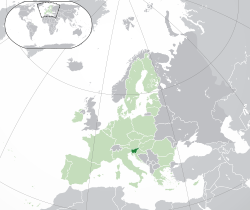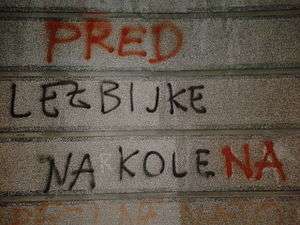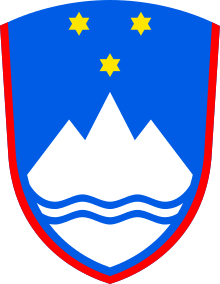LGBT rights in Slovenia
Lesbian, gay, bisexual, and transgender (LGBT) people in Slovenia face challenges not experienced by non-LGBT residents, though the laws concerning LGBT citizens have evolved over time.
 Location of Slovenia (dark green) – in Europe (light green & dark grey) | |
| Status | Male legal since 1977, female was never criminalized |
| Military | Gays, lesbians and bisexuals allowed to serve openly |
| Discrimination protections | Sexual orientation protection (see below) |
| Family rights | |
| Recognition of relationships | Registration of same-sex partnership between 2006 and 2017 Partnership since 2017 |
| Adoption | Step-child adoption and recognition of abroad-registered same-sex adoptions |
LGBT history in Slovenia
Under the Penal Code of 30 June 1959, male homosexual acts were illegal in all of (now former) Yugoslavia. During the first half of the 1970s the power over penal legislation was devolved from the Federal Republic to the eight states and provinces. A new penal code that decriminalised homosexual intercourse passed in 1976 and came into force in 1977. All discriminatory provisions were removed. There were no references to lesbian relationships in the old legislation.
Legality of same-sex sexual activity
Same-sex sexual activity age of consent is 15 years regardless of sexual orientation and has been legal since 1977.
Recognition of same-sex relationships
Registered partnership for same-sex couples has been legal since 23 July 2006, with limited inheritance, social security and next-of-kin rights.[1]
In July 2009 the Constitutional Court held that Article 22 of the Registration of Same Sex Partnerships Act (RSSPA) violated the right to non-discrimination under Article 14 of the Constitution on the ground of sexual orientation, and required that the legislature remedy the established inconsistency within six months.[2][3]
On 3 March 2015, the Assembly passed the bill to legalize same-sex marriage in a 51–28 vote.[4] On 10 March 2015, the National Council rejected a motion to require the Assembly to vote on the bill again, in a 14–23 vote.[5] Opponents of the bill launched a petition for a referendum. The petitioners have gained more than enough signatures for a referendum. On 22 October 2015, in a 5–4 vote, the Constitutional Court ruled the National Assembly could not interpret the constitution and that the vote to block the referendum was illegal.[6] The referendum took place on 20 December 2015 and the bill was rejected.[7]
On 21 April 2016, the Assembly approved the bill to give same-sex partnerships all rights of marriage, except joint adoption and vitro fertilisation.[8] A petition for a referendum was launched, but the president of the Assembly didn't allow the referendum. He said that it was an abuse of the referendum law. The law took effect on 24 May 2016 and it became operational on 24 February 2017 without changes in marriage (only civil partnership).[9][10][11][12]
Discrimination protections
Since 1998 discrimination on basis of sexual orientation in workplaces has been banned. The same goes for employment seekers.[13] Discrimination on the basis of sexual orientation is also banned in a variety of other fields, including education, housing and the provision of goods and services. The anti-discrimination laws however, are vague and open to interpretation and thus, very rarely enforced.[14] In July 2009, the Constitutional Court held that Article 14(1) of the Slovenian Constitution bans discrimination based on sexual orientation.[2][3]
On 17 February 2016, the government introduced new anti-discrimination bill, which prohibits discrimination based on sexual orientation, gender identity and gender expression, among others. It was approved by the National Assembly on 21 April, in a 50–17 vote.[15][16] The National Council did not require the Assembly to vote on the bill again. On 28 April, the union of migrant workers SDMS filed a motion, with required 2,500 signatures, in order to be allowed to proceed with the petition for referendum.[17][18][19] However, on 5 May, the Speaker of the National Assembly Milan Brglez refused to set a thirty-five-day deadline during which the proposers could collect 40,000 valid signatures to force the referendum, arguing that this and several other SDMS referendum initiatives constitutes an abuse of the referendum laws.[20][21] He sent the bill for promulgation the next day.[22][23] It was promulgated by President Borut Pahor and published in the official journal on 9 May 2016.[24][25] On 10 May, SDMS challenged the Brglez's decision to the Constitutional Court.[26] On july 2016, The Constitutional Court rejected the challenge[27]
Public opinion
A Eurobarometer survey published in December 2006 showed that 31% of Slovenians surveyed support same-sex marriage and 17% think homosexuals should be allowed to adopt children (EU-wide average 44% and 33%).[28]
A poll conducted by Delo Stik in February 2015 showed that 59% of Slovenians surveyed supported same-sex marriage, while 38% supported adoptions by same-sex couples. The poll also gauged support for the same-sex marriage bill, which was debated in the National Assembly at the time. The results showed that a narrow majority (51%) of Slovenians surveyed supported the bill.[29]
LGBT movement in Slovenia
The lesbian and gay movement has been active in Ljubljana since 1984, when MAGNUS, the gay section at ŠKUC (Student Cultural and Art Centre, Ljubljana), was founded as the "Cultural Organisation for Socialisation of Homosexuality." A pro-lesbian feminist group, Lilit, was started in 1985, followed in 1987 by LL, a lesbian group within ŠKUC. In 1990 Magnus and LL founded the national lesbian and gay campaigning organisation, Roza Klub.
Other parts of the country have no or very few organizations regarding sexual orientation.
Social conditions
Gay culture
In Ljubljana there are many gay-friendly clubs and bars. Having started with only a few, the number increases every year. At klub K4 in Ljubljana there are gay and lesbian parties (K4 ROZA) one Saturday a month. At clubs Factory and Bolivar there are gay and lesbian parties organized by Jing Jang group. Parties take place there usually once a month. Other gay-friendly bars and clubs in Ljubljana are Lan, Tiffany and Galerija.
Anti-LGBT violence
There have been numerous instances of violent gay-bashing all over Slovenia, including an attack that occurred in June of 2009 during a literary event at one of the famous gay bars in Ljubljana, Open. Gay rights activist and radio journalist Mitja Blažič was hospitalized following the attack by eight black-masked younger males with torches.[30]
In 2007 in Maribor several individuals were beaten up by younger males during a Pride parade.
In March 2019, a brick was thrown through the window of Društvo DIH – Enakopravni pod mavrico, an LGBT NGO.
In 2019, a gay man was beaten by several individuals in Murska Sobota. He suffered kidney injuries and several broken ribs.
On 1 November 2019, a group of individuals vandalized an LGBT club, Tiffany, in the early morning hours at Metelkova in Ljubljana and threatened the staff with violence.
On 24 November 2019, a gay man was called names and threatened with assault and by a security guard in a bar called Trust in Maribor.
Summary table
| Same-sex sexual activity legal | |
| Equal age of consent | |
| Anti-discrimination laws in employment only | |
| Anti-discrimination laws in the provision of goods and services | |
| Anti-discrimination laws in all other areas (incl. hate speech) | |
| Same-sex marriage | |
| Recognition of same-sex couples | |
| Joint adoption by same-sex couples | |
| Step-child adoption by same-sex couples | |
| Adoption by single LGBT persons | |
| LGBT allowed to serve openly in the military | |
| Right to change legal gender | |
| Access to IVF for lesbians and bisexual women | |
| Conversion therapy banned on minors | |
| Homosexuality declassified as an illness | |
| Commercial surrogacy for gay male couples | |
| Automatic parenthood on birth certificates for children of same-sex couples | |
| MSMs allowed to donate blood |
References
- "Archived copy". Archived from the original on 23 October 2012. Retrieved 26 July 2012.CS1 maint: archived copy as title (link)
- "Odločitve – Ustavno sodišče Republike Slovenije". www.us-rs.si.
- "Constitutional Court of Slovenia Upholds Equal Rights for Same Sex Partners". Equal Rights Trust. 19 July 2009.
- "Slovenian parliament votes to legalise same-sex marriage".
- "Državni svet ni izglasoval veta na zakon o družinskih razmerjih". RTVSLO.si.
- "Ustavni sodniki prižgali zeleno luč za referendum o zakonu o zakonski zvezi". RTVSLO.si.
- "Marriage equality voted down in referendum". www.sloveniatimes.com.
- "Državni zbor sprejel zakon o partnerski zvezi". siol.net.
- "Zakon o partnerski zvezi". 10 May 2016.
- "STA: New civil unions act enters into force". english.sta.si.
- "Slovenia boosts rights of same-sex couples".
- "STA: Same-sex partnership act implemented". english.sta.si.
- "FindLaw for Legal Professionals | Law & Legal Information". Findlaw.
- Report on Homophobia Archived 10 September 2008 at the Wayback Machine, European Fundamental Rights Agency, p. 26
- "Portal DZ - Izbran zakon / akt".
- "STA: Parliament establishes independent equality advocate". english.sta.si.
- "Portal DZ - Izbran zakon / akt".
- STA, Š P. (28 April 2016). "Delavci migranti vložili referendumske pobude še za tri zakone". www.delo.si.
- "Predstavniki delavcev migrantov v DZ vložili referendumske pobude še za tri zakone (daljše)". Archived from the original on 29 April 2016.
- "Portal DZ - Izbran zakon / akt".
- "Brglez je zavrnil še tri referendumske pobude. Odbor 2014 protestiral pred DZ-jem". RTVSLO.si.
- "Portal DZ - Izbran zakon / akt".
- "Portal DZ - Izbran zakon / akt".
- "Uradni list RS, št. 33/2016 z dne 9. 5. 2016" (PDF).
- "Objavljeni zakoni, za katere so delavci migranti predlagali referendume - siol.net". siol.net.
- "Delavci migranti so vložili ustavno pritožbo nad Brglezovo odločitev". RTVSLO.si.
- "Delavci migranti bodo vložili pritožbo na Evropsko sodišče za človekove pravice". RTVSLO.si.
- "Archived copy". Archived from the original on 5 September 2008. Retrieved 29 January 2006.CS1 maint: archived copy as title (link)
- "Večina podpira istospolne poroke, do posvojitev je zadržana". RTV Slovenia (in Slovenian). 16 February 2015. Retrieved 16 February 2015.
- "Foto: Brutalen napad v Ljubljani". RTVSLO.si (in Slovenian). Retrieved 16 January 2020.
- Weber, Nana (25 April 2013). "Sprememba spola v Sloveniji". Pravna Praksa (in Slovenian). GV Založba (16–17). ISSN 0352-0730.
- "Surrogacy law: regulated, unregulated".

